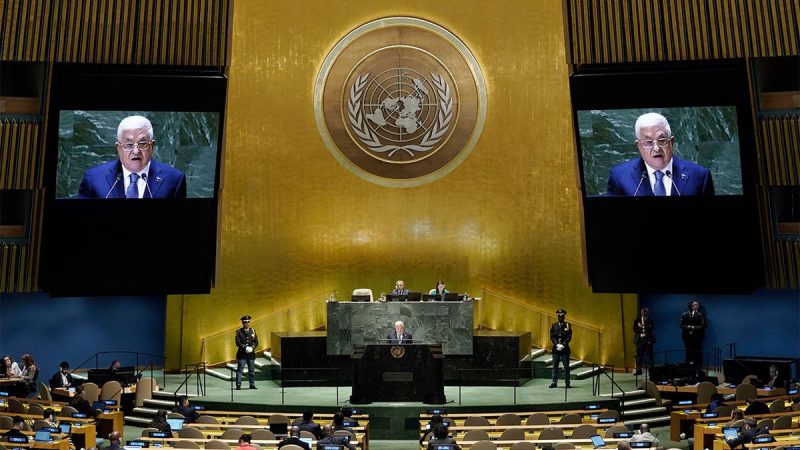
US law could force Biden to pull UN funding if Palestinian recognition bypass succeeds, experts say
The U.S. will face a difficult decision if the Palestinians should succeed in establishing a workaround toward official recognition, which could trigger America pulling all funding from the U.N. in protest, according to experts.
‘If the draft resolution as it currently stands is adopted, U.S. law demands that the U.S. withhold all funds from the U.N.,’ Anne Bayefsky, director of the Touro University Institute on Human Rights and the Holocaust, told Fox News Digital. ‘The question is: Where is Congress? It needs to make it very clear, very publicly, that American law will be upheld and take immediate steps to do so.’
The U.S. in 1990 passed Public Law 101-246, which focused on authorizing appropriations for fiscal 1990 and 1991 for the Department of State. Section 414 of the bill highlighted concerns over the inclusion of the Palestine Liberation Organization (PLO) in the United Nations and specialized agencies.
The section states, ‘No funds authorized to be appropriated from this act or any other Act shall be available for the United Nations or any specialized agency thereof which accords the Palestine Liberation Organization the same standing as member states.’
The broad language – ‘any other Act’ – has created some confusion about what the U.S. would need to do if the PLO, a group internationally recognized as the official representative of the Palestinian people, were to obtain the privileges and powers of a full and recognized U.N. member.
‘It is no surprise that Biden officials are not hitting the airwaves clearly announcing that a General Assembly end run around the U.N. charter, purporting to grant the so-called state of Palestine the trappings of full-member state status, is not only contrary to the spirit and intent of the U.N.’s own charter but is contrary to American law,’ Bayefsky said.
‘A majority of U.N. member states are not free democracies,’ she said. ‘The Islamic and Arab blocs of states, a large percentage of which continue to dispute even Israel’s right to exist, wield enormous power, and despite American isolation in U.N. circles on issue after issue of importance to the United States, including the constant aggression and antisemitism meted out to Israel, American citizens still bankroll the place and host the institution in its midst.’
The U.S. likely did not think it would have to wrangle with this problem, especially as American representatives at the U.N. continue to veto measures to recognize the Palestinians as a full member of the organization.
However, a new draft resolution would seek what some have called a ‘workaround’ that would seek the United Nations General Assembly (UNGA) to approve powers to vote and veto without official recognition as a full member of the organization.
‘They’re still carelessly killing Americans and killing Israelis through terrorism and then giving those who do it if they’re arrested, if they don’t die to a suicide bomb, payments and a guaranteed position in the PLA when they get out of prison,’ Rep. Christopher Smith, R-N.J., told Fox News Digital. ‘That’s [one] of the ugliest, most anti-democracy and anti-human rights policies I’ve ever heard of.’
‘Pay-to-slay is exactly what happened with Hamas just recently; obviously it’s been an ongoing problem with Oct. 7, [and] they’re part of the Palestinian effort,’ Smith said, calling the approach an ‘impermissible act’ and asking ‘how do you reward’ an organization like Hamas that ‘calls for the evisceration of Israel.’
‘If you’re going to play some game at the United Nations that somehow this isn’t a full-blown membership, [then] this shows a deceptive approach to dealing with member states,’ Smith added. ‘How dare they even think of doing this? It may pass in the General Assembly – they need two thirds, as we all know – but they also need the Security Council to do it as well, and thankfully, the United States will veto that.’
A U.S. State Department spokesperson told Fox News Digital that the U.S. is ‘aware of the draft resolution and reiterate[s] our concerns with any effort to extend certain benefits to entities when there are unresolved questions as to whether the Palestinians currently meet the criteria under the U.N. charter.’
‘The United States is committed to intensifying its engagement – with the Palestinians and the rest of the region – not only to address the current crisis in Gaza but to advance a political settlement that will create a path to Palestinian statehood and membership in the United Nations,’ the spokesperson added, noting ‘direct negotiations’ as the path toward statehood.
Israeli Ambassador to the U.N. Gilad Erdan said the resolution provides de facto status and rights of a state and that he fully expects the U.S. to ‘completely stop funding the U.N. and its institutions, in accordance with American law’ should the resolution pass, he said in a recorded video statement.
Then-President Obama, for example, cut funding to UNESCO (U.N. Educational, Scientific and Cultural Organization) in 2011 after the organization granted full membership to the Palestinians, which crippled the agency as the U.S. accounted for 22% of the budget. UNESCO froze job hires and cut programs after losing U.S. funding, according to Reuters.
‘We are coping in very difficult circumstances,’ UNESCO’s Irina Bokova told reporters at the time. ‘We’re fundraising this year, but it’s not sustainable on a long-term basis. We’re not closing UNESCO, but member states will have to rethink the way forward. UNESCO will be crippled.’
The U.S. fully left the organization in 2017 as part of concerns over perceived anti-Israel bias from the group, with Israel following out the door in 2018. The U.S. rejoined UNESCO in July 2023 over concerns that China had gained an outsized level of influence in the group during America’s absence.
But that absence provided a glimpse of the impact the U.S. could have if it cut its broader funding to the United Nations. Brett Schaefer, the senior research fellow in international regulatory affairs at the Heritage Foundation, noted the U.S. currently accounts for around a quarter of all funding to the U.N. regular budget and the peacekeeping budget.
‘In one fell swoop, one rash decision, they could essentially prohibit the U.S. from providing a fifth of the U.N.’s funding,’ Schaefer told Fox News Digital. But he noted that the way the resolution’s adoption plays out could provide the U.S. some wiggle room.
‘If the Palestinians don’t join other organizations, technically, that funding could continue to the special interest groups,’ he said. ‘However, every single one of those specialized agencies basically grants membership opportunities to any other member of the United Nations.’
‘They have been successful in getting into several U.N. special organizations, especially agencies including UNESCO,’ Schaefer added. ‘So, if they have the votes to get into the U.N. in this manner, what’s to stop them from doing and following a similar path with specialized agencies?’
Schaefer laid out the ongoing issues that admitting the Palestinians into the United Nations would pose, such as the fact that Hamas remains the official ruling party of the Gaza Strip, which would mean admitting a terrorist organization into the United Nations with the power and benefits of a member state.
‘There is no question that Palestinians do not meet that criteria,’ Schaefer insisted. Referring to Hamas, he noted that ‘their founding documents call for the destruction of Israel. They have sponsored terrorist acts for decades.’
‘Even the Palestinian Authority, which the United States has been negotiating with … celebrated the terrorist attacks on Oct. 7, so this is not a situation where there is a peace-loving state,’ he added.
More importantly, however, Schaefer said China has become the second-largest funding source for the United Nations, which would revive U.S. concerns over what influence Beijing could command in the absence of the U.S.
According to Schaefer, China tripled its contributions over the past decade to account for around 15% of the regular budget. Other wealthy nations, such as Saudi Arabia and Qatar, contribute about 1% to 2% of the U.N. general budget, respectively.
But the impact of America cutting its funds from the U.N. would still prove crippling to the organization, according to Schaefer.
‘Your entire operations would come to a halt right away,’ he said. ‘It doesn’t mean you couldn’t do your job, but it would have a massive impact on your daily operations’ and that the bulk of the U.N. general budget goes toward staff salaries and benefits, utilities and maintenance.
The Associated Press contributed to this report.
